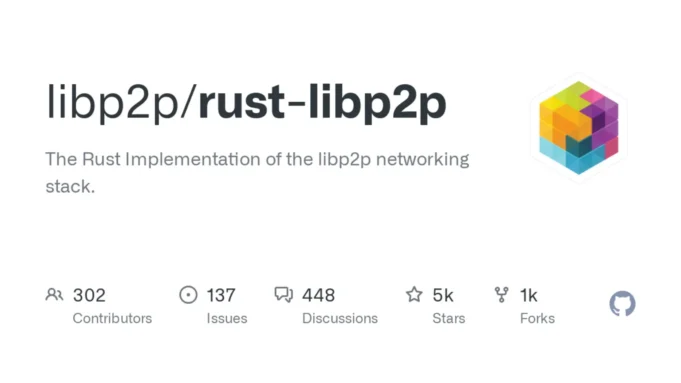The rust-libp2p repository is the central hub for developing the Rust implementation of the libp2p networking stack, a modular and extensible framework for building peer-to-peer (P2P) applications.
It is widely used in distributed systems such as Ethereum, IPFS, and Filecoin. Below is an overview of its functionality and structure.
Core Functionality
- Transport Layer: At its foundation, rust-libp2p provides a
TransportAPI that defines how data is sent across the network. This includes support for various transport protocols like TCP and WebSockets, as well as upgrades like encryption and compression. - Stream Multiplexing: The library supports multiplexing protocols through its
StreamMuxerinterface. This allows multiple independent streams to coexist on a single connection, essential for efficient P2P communication. - Network Behaviour: The
NetworkBehaviourtrait defines what data is sent and to whom, enabling users to implement custom protocols or use built-in ones likepingorgossipsub. This clean separation between “how” and “what” simplifies protocol design. - Swarm Management: The
libp2p-swarmmodule orchestrates connections and interactions between peers, providing tools to manage application-level protocols using theNetworkBehaviourandConnectionHandlerinterfaces. - Application Protocols: Rust-libp2p includes implementations of common P2P protocols such as Kademlia (for DHT-based peer discovery), Gossipsub (for pub-sub messaging), and request-response patterns for file sharing or other use cases.
- core/: Implements the foundational APIs like
TransportandStreamMuxer. - transports/: Includes various transport protocol implementations.
- muxers/: Houses stream multiplexing protocol implementations.
- swarm/: Manages peer connections and behaviors.
- protocols/: Contains application-level protocol implementations.
- examples/: Demonstrates practical usage of libp2p features, such as file sharing or ping-pong messaging.
The repository encourages contributions through GitHub issues, discussions, and biweekly community calls. It operates under the IPFS Code of Conduct to maintain a respectful environment.
Prominent projects using rust-libp2p include Ethereum consensus clients like Lighthouse, Filecoin implementations, and decentralized storage solutions like Safe Network.
For developers, rust-libp2p provides comprehensive documentation on docs.rs, making it accessible for building robust P2P applications.












%20Works.png)




